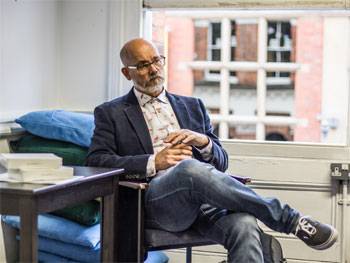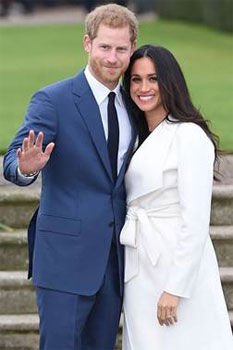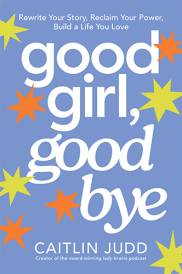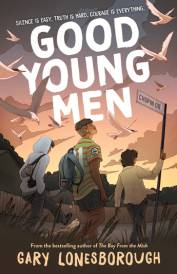Brad Argent Royal Wedding Invite List Interview

Should you be invited to the royal wedding? Find out!
With the royal wedding between HRH Prince Harry and Ms. Meghan Markle just days away, the entire world will have their TV screens tuned-in to watch the fairytale nuptials. Given our country's ties to the Commonwealth and expatriate (read: convict) history, have you ever wondered if there's royalty hiding in your family tree?
While many people have royal lines, it can be challenging to prove it. For most of us, it means going back quite a way in time, through periods where the records can be quite sparse.
For those of us fortunate enough to tie into a royal or noble lineage, there are records such as Ancestry's Royal Collection, which can shed light on your famous forebears, including genealogy, heraldry, and coat of arms. The collection also includes the names and details of more than 5,000 -high born' families and those individuals and families of royal or noble descent who migrated around the British Empire.
Claim your birthright:
Explore surnames: Cross-reference surnames in your family tree with those found in Burke's Commoners and Landed Gentry of Great Britain and Ireland. A snapshot of the peerage of the British Empire in 1865, this listing includes information about individuals who were usually descended from royalty or the aristocracy. Ancestry's surname tool can also be an easy way for users to confirm likelihood of any royal suspicions… try it out!
Seek out wealth: Look for evidence of wealthy ancestors through domestic staff listings on census records, property and businesses documented in wills and probate records and ancestors who were extensive travelers listed in immigration records traveling in First Class.
Investigate titles: If any of your ancestors had titles, explore the age and origins of those titles.
Look for places: For surnames in your family tree that are also the name of a place – for example a town or parish – do further research to establish any connection between that ancestor and significant ownership in that location.
Find the Normans: Investigate whether any of the surnames in your family tree has Norman origins and if so, research that particular branch of the family as far back as you can as many early Normans had direct royal connections.
 Interview with Brad Argent, Genealogist
Interview with Brad Argent, Genealogist
Question: What is Ancestry's 'Royal Collection'?
Brad Argent: The Royal Collection on Ancestry.com.au features more than 50 historical publications detailing almost half a million people born into or descended from royalty, the peerage, nobility and the landed gentry. The collection also includes the names and details of more than 5,000 -high born' families and those individuals and families of royal or noble descent who migrated around the British Empire. The Royal Collection highlights royal and noble family trees, coats of arms and family crests, lineage and titles of those who immigrated to the Americas, stories of individuals and families and more.
Question: How can we find out if there is royalty hiding in our family tree?
Brad Argent: Finding that elusive Royal connection will take some work, but the simplest path could be to leverage off the work of other people. By building your family tree online with Ancestry you'll get to benefit from the research work of millions of other people through access to 100 million family trees. Someone else out there might have already found your royal connection – all you need to do is link to them!
Question: Is it easy for us to find our lost royal lineage?
Brad Argent: It's by no means a simple task and it could take hours and hours of online research, but there'll be many highlights along the way as you uncover more and more ancestors. If you don't already know about a connection to royalty, then it's likely that any connection you have might be to minor nobility. Lookout for ancestors who are from a different social class than the bulk of your family – they might be clergy, or hold government office, or positions of power, whilst all your other ancestors were farm labourers. Historically positions of power and authority were inherited and there could only be one -Lord of the Manor' so second sons often joined the clergy or the military (daughters were often married off within the same social class).
Question: What costs and tests are involved in tracking our family lineage?
Brad Argent: It costs nothing to begin. You simply find the oldest person in the family and start asking questions. Then jump on over to Ancestry and take advantage of their 14 day free trial to build out your family tree and find evidence to support your family stories.
Question: How has testing DNA testing changed how we track our family history?
Brad Argent: For many people DNA is the starting point for family history – it's simple, scientific and surprisingly affordable (AncestryDNA retails for $129 plus shipping). The results give you a fascinating insight into where your biological family comes from within the last 100 to 1000 years – giving you a great starting point. DNA also matches you with other people in the network – creating an instant extended family. Many, many people find cousins that they've never met.
Question: Is DNA testing more accurate than a surname tracking method?
Brad Argent: DNA testing relies solely on biological data. Whilst the ethnicity results are estimates, the process used to predict your ethnicity is based on well understood science. The -cousin matching' – this is where we compare you DNA sample with the almost 10 million other DNA samples in the network – is very, very accurate. Usually our biology and our history align. Usually. Sometimes our recorded ancestors might not be our biological ancestors due to an unrecorded adoption, or to a -non-paternal event', and this is where we'll get cousin matches that don't fit into our understand of our family history. Events like this are rare, but they do happen.
Question: What inspired your passion for genealogy?
Brad Argent: My dad. Over 20 years ago he asked me to help him upgrade his family history software. As part of that process I started to look a bit closer at just where we came from and what brought our family to Australia in the 1880's. I elbowed dad out for the way - I was hooked.
Question: What did you find when you tracked your own families history?
Brad Argent: My mother's side of the family is riddled with convicts – Australian Royalty! My 4 x Great Grandmother, Susannah Lallamont, was convicted at the Old Baily for stealing some money and was sentenced to transportation in 1812. The journey was interrupted when the ship she was on was taken by pirates and her and her fellow convicts were left stranded on Cape Verde. She finally arrived in Australia in 1814 and less than a year later married an armourer from the ship that rescued her.
Interview by Brooke Hunter
MORE





